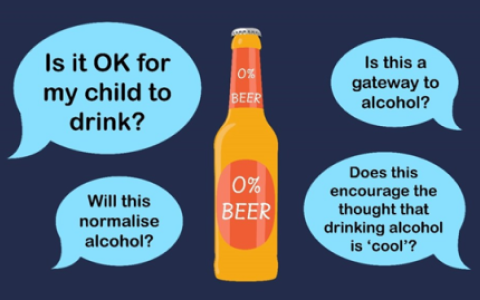Proceed with caution? Parents’ views on zero-alcohol drinks
Read full article published in Public Health Association Australia (PHAA) here - Intouch Public Health
Parents are under a lot of pressure – often facing uncomfortable decisions and tricky conversations with their teenagers around alcohol.
Our new research – published recently in the Australian and New Zealand Journal of Public Health – shows how parents now face the additional challenge of navigating zero-alcohol drinks that look, and taste, like the real thing.
In qualitative interviews, parents felt confused and conflicted on whether zero-alcohol drinks are suitable, healthy, or possibly harmful for teenagers.
As a result, around half of the parents we spoke to were concerned that these drinks could lead to their children later increasing their alcohol consumption. One parent said:
“It works like a gateway drug, you know, that they start on the zero-alcohol and they wanna try the real thing.”
Another parent talked about how supplying zero-alcohol to their teenagers might reinforce cultural norms around alcohol:
“If it’s the whole ‘being cool because you’re drinking alcohol’ sort of link, it’s almost in the same realm as being harmful, you know: it’s glorifying, it’s normalising everything about alcohol.”
Parents also voiced concerns relating to the current marketing of zero-alcohol drinks and the similarity of branding to their alcohol-containing equivalents, particularly the zero-alcohol drinks produced by major alcohol companies—especially beer brands.
Study participants described how they had received zero-alcohol drinks in public giveaways, and were concerned about the potential reach to their children, including through building alcohol brand awareness.
In our survey of more than 1100 Australian parents, most reported that they had not supplied zero-alcohol drinks to their teenagers.
A sizeable minority (two in five) were either unsure, or planning to supply these drinks at some stage before their child’s 18th birthday, though.
Parents who thought that the drinks could be beneficial for teenagers, for example by making it easier to say no to alcohol at parties, were more likely to supply zero-alcohol drinks.
However, those who thought zero-alcohol drinks might influence an adolescent to drink alcohol more regularly were less likely to plan to give them to their child.
We found that parents who had supplied alcohol to their teenagers were also more likely to supply zero-alcohol drinks, as were parents who were confused about the current NHMRC alcohol guidelines (these make it clear that those under 18 “…should not drink alcohol to reduce the risk of harm”).
Nathan Harrison and Ashlea Bartram, NCETA
We gratefully acknowledge our co-authors, participants, and community parent advisors involved with the two studies described here. This zero-alcohol research has been funded by NHMRC GNT1157069 (to Professor Jacqueline Bowden) and produced with the financial and other support of Cancer Council SA’s Beat Cancer Project on behalf of its donors and the State Government of South Australia through the Department of Health. NCETA receives funding from the Australian Government Department of Health and Aged Care to support research regarding alcohol and other drugs.












